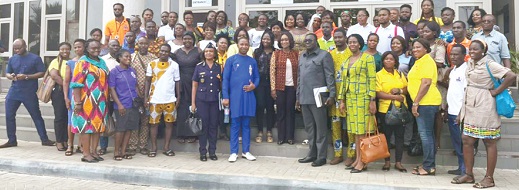
Don't stop using mobile money - GRA urges public
The Ghana Revenue Authority (GRA) has urged the public not to shun the use of mobile money and electronic transaction platforms in a bid to avoid the payment of the Electronic Transfer Levy, popularly known as E-Levy.
Rather, the Authority has asked the public to use mobile money and other electronic transaction platforms due to their convenience and safety.
Advertisement
The advice was given by the Commissioner of the Services and Support Division of the GRA, Julie Essiam, on May 12, 2022, when the authority engaged associations of traders in Accra on the Electronic Transfer Levy and get their buy-in.
They included the Ghana National Tailors and Dressmakers Association, the Ghana Hairdressers and Beauticians Association, the Association of Garment Makers, the Ghana Association of Garages, the Ghana Association of Electronic Services and the Ghana Electrical and Electronics Association.
At the event, GRA officials shared with the associations what the E-Levy is about, who the levy covers, those excluded by law, and how challenges experienced could be addressed.
Revenue target
Ms Essiam said the public must see the payment of taxes as their patriotic duty, adding that the government needed the support of all in realising the Ghana Beyond Aid.
She said there had been a number of erroneous information in the public domain about the E-Levy, emphasising that "as implementers of the levy we deem it important to continuously educate our cherished stakeholders on new policies and initiatives to obtain their support and buy-in."
The Authority, she said, would need the support and co-operation of the public to enable it to achieve its revenue target of GH¢80.3 billion for the year.
So far, she said the implementation of the E-Levy which took effect on May 1, 2022, had been smooth despite the initial hitches.
To ensure that the citizenry was well informed about the levy, she said the GRA was collaborating with the Information Services Department (ISD) to sensitise communities across the country.
Support government
A Deputy Minister of Finance, Abena Osei Asare, commended the associations for their understanding, saying their work contributed to the country’s growth through the creation of employment, generation of wealth and the payment of taxes.
“The levy is a strategic policy by the government to boost domestic revenue for developmental projects. We cannot always rely on foreign donors, hence the need to raise the needed revenue internally, she stated.”
The deputy minister said the traders associations were a major pillar necessary to achieve the objectives of the E-levy so it was necessary for them to support the government.
She said revenue raised through E-Levy would be used to finance road development and fund the YouStart Programme which would support one million young people.
The government, she said, had indicated its plans to devote GH¢10 billion to support SMEs under the YouStart programme with GH¢5 million from banks and the rest from the government which would include revenue from E-Levy.
Advice
An E-Levy Technical Committee member, Isaac Amoako, explained that E-Levy was a levy on all electronic transfers of money apart from those excluded by law and that the rate was 1.5 per cent.
He said presently mobile money providers, banks and payment service providers were responsible for charging the levy.
Between May 1 and June 30, 2022, Mr Amoako said the charging entities would levy their customers after which the GRA would take over using its system that had been developed to monitor all electronic money transfers.
Transactions excluded by law, he explained, included payment of utilities, airtime, foreign or inward remittances and point of sale uses.
Mr Amoako urged traders who use mobile money platforms to accept payment from their clients to apply for merchant accounts from the telecommunications companies to facilitate payment without E-levy charges by their clients and customers.
"Your customers will not pay the E-levy if they pay for goods and services through your registered merchant account. You will not pay telco charges and you can link your merchant account to your bank account. You will also have to go to GRA for a tax clearance certificate to complete the registration," he said.
He urged traders and the public to call the dedicated phone numbers such as *100# for all mobile networks when they needed help, further clarification or want to report some challenges.
Also, he said a dedicated call centre had been set up to help individuals who needed clarification or experienced any form of challenges.
"You can call through the toll free number 0800-900-1100 or send a message through WhatsApp on 055-299-000 or 020869-1664".
Concerns
During an open forum, a member of the Ghana Hairdressers and Beauticians Association, Grace Obour, commended the GRA for the engagement and asked for more sensitisation on the levy.
A trader, Maxwell Kojo Mintah, said the government must define the amount of taxes paid by small-scale businesses.
Another participant, Emelia Botwe, called for transparency and accountability on the part of the government on the E-Levy to encourage the public to pay willingly.





